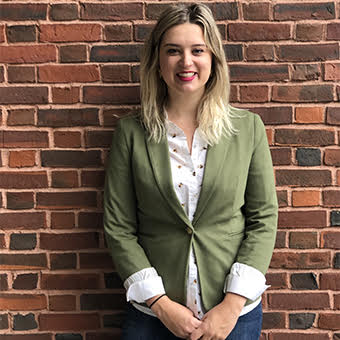Student Experience Profile: Diana Filar, English
 March 25, 2021
March 25, 2021
Hannah Jung | Graduate School of Arts and Sciences
Diana Filar recently received a Student Experience Grant from the Connected PhD that supported her role as a Grants and Research Writing Intern at the International Institute of New England (IINE), a nonprofit that provides human services for immigrants and refugees. In her role, she worked to collect research, organize, write, and package grant applications. She also developed templates and collected data and statistics about different immigrant groups and programs that would make applying to future similar grants much easier.
Tell us about your experience. What skills did you build through your project?
I think the best takeaway from my project was being able to see, articulate, and put into practice the skills I had already attained as a PhD student and apply them to a position outside of academia such that the realm of my existing skills expanded. For instance, I was already familiar with writing on deadlines, but in the PhD program these are usually slightly more loose and with more time in between. At the internship, I saw that new grants were due every week, and I had to practice getting information and data from different people in the company (e.g., the programs director, the data analyst) in order to meet my deadline.Near the end of my internship, I contributed significantly to two grant applications, both of which were a team effort. I gained experience bouncing ideas off someone else out loud and writing collaboratively, something that isn’t necessarily common in the humanities side of academia. As a PhD student, when I work on my own projects, it does feel like a mostly solitary affair. In this role, I had a palpable sense of being needed; everyone really made me feel like part of the team.
What are your professional/career goals, and how has this experience helped you (re)think about this goal? How did this experience help build your professional profile?
Although I would still be interested in what might be called a traditional academic research or teaching position, I have long been interested in the possibilities of diverse careers outside of that track. This experience showed me the thrill of writing on a short-term deadline and working collaboratively with smart, professional people to create a final product we could be proud of. I can imagine being fulfilled in a similar outcome-driven, human/humanities-oriented position that valued and made use of my organizational, research, and writing skills.
Why were you interested in a Connected PhD grant? At what stage in your program did you apply?
I sought out the Connected PhD grant as a way to develop and build on the experiences my academic career has provided thus far. I applied in the latter half of my fifth year in the program, a sort of culmination of the career exploration I had done previously through my various positions and employment in assorted departments at Brandeis. I wanted to expand my professional profile outside the realm of the university while still utilizing the skills I have cultivated during my tenure as a PhD student. The internship at IINE specifically intersected with and expanded upon my academic interests on a number of levels, including my research on contemporary immigrant issues, my administrative experience as a Program Assistant at the Mandel Center for the Humanities, and my professional interest in grant writing and the nonprofit sector as potential avenues for my career.
What advice do you have for current students as they propose Connected PhD projects?
I would suggest that students think about which aspects of the PhD they enjoy most, what skills they’d like to further develop, and/or what potential avenues a career could take. Although I would still love to work as a professor on the tenure track, spending some time coming to terms with the dearth of these positions and developing a plan for pursuing that path alongside others has really helped with my mental health. Filling out the assessments on ImaginePhD also helped to confirm things I already imagined to be true about myself and to suggest careers that aligned with those values and truths. On a more practical note, I would also advise that students have a trusted advisor, someone from GSAS or career services, or someone from their life who works outside of academia look over their application.






